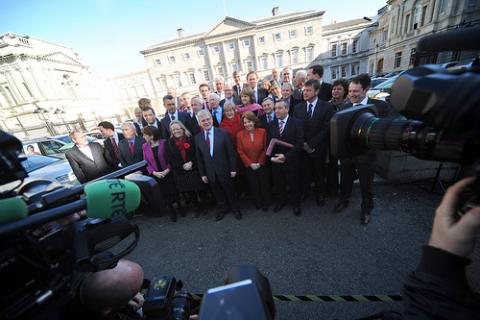Labour needs to stop pretending

In obeying the optics driven demand that government must be seen to be unified, the Labour Party is setting itself up for the same fate as the Greens. By Philip O'Connor.
One of the great soccer strike partnerships of the late 90s was between Andy Cole and Teddy Sheringham, who, when they played together, averaged a goal between them every 85th minute.
In other words, putting the two of them on the field together was more or less like giving Manchester United a one-goal head start; it marked one of the most successful periods in the club’s history.
The pair despised each other, and never a single word was spoken between them.
They despised each other, yet they put that aside for the good of the team.
Contrast this with the behaviour of the Labour party in government, where what used to be the worker’s movement now simply shores up the idea that this crisis should be paid for by the weakest in society.
No dissent is tolerated.
The revolution will not be televised.
But the nodding platitudes and the spoofery about the ATMs running out of cash and the household charge keeping libraries open will.
The reasons for Labour’s silent acquiescence are twofold – a desire to be in power and the modern Irish democratic problem of optics.
Not so long ago, the “Gilmore for Taoiseach" idea actually had some credence – there was a possibility that, given how the free marketeers had been allowed run riot and destroy the country, Labour might actually become the biggest party in the country.
That notion is now laughable, mostly due to the narcissistic notions of Labour themselves.
As soon as Gilmore handed over the hostage to fortune that was “Labour’s way or Frankfurt’s way” the game was up.
The best that they could hope to salvage was what they ultimately got – a junior role as a powerless party in a coalition government subservient to Europe.
The Labour/Worker’s Party old guard got one last shot at power, only to be given the mop and bucket and told to do the dirty work at ministries like Social Protection.
Meanwhile, the pitiable Joanna Tuffy is sent out on Vincent Browne with a pocketful of spin that neither she nor we believe in. Beaten into the ground, she clutched at the final straws of guff.
“People are more hopeful now,” she opined. Indeed they are – hopeful that, at the next election, the likes of the spineless Tuffy will be ousted from Leinster House.
Tuffy’s myopic performance is symptomatic of how politics in Ireland is reduced to who can spin faster.
The optics of modern Irish political theory demand that the government must be seen to be unified – no contrary voices may be heard.
This is the single most damaging factor to come out of the last election – in getting such a large slice of the vote and deciding to use it to go into government, Labour have effectively neutered themselves.
We hear a lot about the size of the government mandate, but this is not what people voted for. Those that voted for both Labour and Fine Gael have every right to feel betrayed.
But at long last, the more canny operators on Labour’s front bench – Howlin and Burton – appear to have spotted this and are now starting to make their move. The cracks are beginning to show.
There are things being done by this government that no Labour party should ever support. It does not need to support every single decision made by the government.
Nor should it demand that its deputies do so, gagging them about the household charge when every other left-leaning organisation railed against it.
In short, they could be the Andy Cole to Enda’s Teddy Sheringham.
(That is probably the first and last time that comparison will be made).
Standing up and being counted would be a good thing for the Labour party.
This will not be the last government in the history of the state. But it might be the last one to feature Labour.
After all, the Greens allowed themselves to be swept along on the tsunami of Fianna Fáil’s greed and corruption, and eventually it drowned them.
Unless Labour find their way back to their roots and stop agreeing with everything Enda and the Troika say, a similar fate awaits. {jathumbnailoff}
Philip O’Connor is an Irish writer, journalist, producer and communications professional based in Stockholm, Sweden. This piece originally published on Our Man In Stockholm; reproduced with permission.
Image top: The Labour Party.
